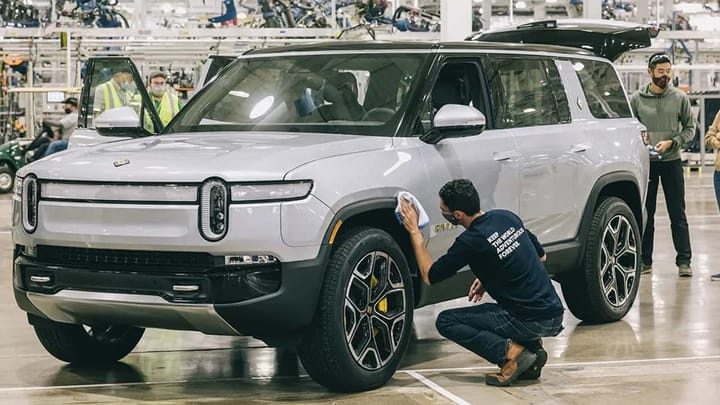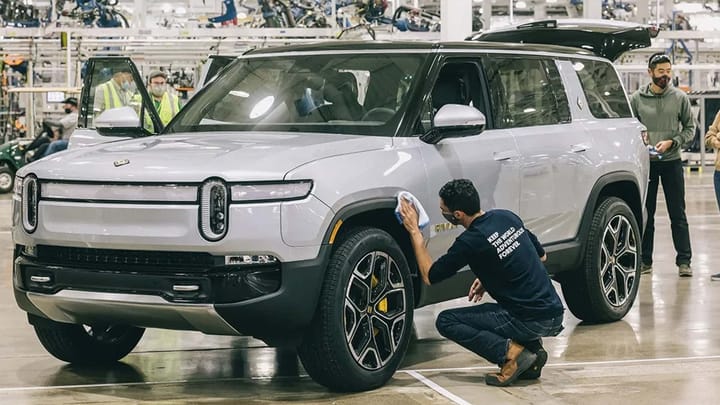Table Of Contents
Rivian's Strategic Shifts and Partnerships
Rivian Electric Delivery Vans (EDVs)
Financial Performance and Market Trends
Challenges and Opportunities in the EV Industry
FAQ
As Rivian navigates the evolving landscape of the electric vehicle (EV) industry, its strategic shifts and partnerships are pivotal in shaping its future. From ending its exclusivity with Amazon to expanding its manufacturing capabilities, Rivian is making significant moves to solidify its position in the market. This article delves into the intricacies of Rivian's journey, exploring its financial health, market trends, and the challenges and opportunities that lie ahead in the EV sector.
TLDR
- Rivian ends Amazon exclusivity, opening doors to new partnerships, including a collaboration with AT&T.
- The company is expanding its manufacturing footprint in Georgia and has plans for global expansion of its Electric Delivery Vans (EDVs).
- Rivian's financial health and strategic partnerships are crucial as it navigates investment and stock market trends.
- The EV industry faces challenges but also opportunities, especially in accelerating EV adoption in Europe.
Rivian's Strategic Partnerships: Paving the Way for a Sustainable EV Ecosystem
Rivian's journey through the electric vehicle (EV) landscape is marked by strategic shifts and partnerships that not only aim to bolster its market position but also significantly impact the broader EV ecosystem. By collaborating with giants like Ford and Amazon, Rivian is not just expanding its footprint but is also playing a pivotal role in shaping the future of sustainable transportation.
One of the most notable collaborations is with Ford, a partnership that leverages Ford's extensive supply chain and distribution network. This alliance is instrumental in streamlining Rivian's production and distribution processes, thereby enhancing the efficiency and reach of EV adoption. Moreover, Rivian's commitment to developing a comprehensive charging infrastructure, in collaboration with Ford, addresses one of the most pressing challenges in the EV market - the scarcity of charging stations. This initiative is expected to boost the convenience and accessibility of EV charging, fostering a more robust growth of the EV market.
"By working together with industry giants and charging infrastructure providers, Rivian is not just enhancing its product offerings but is also contributing to the creation of a sustainable ecosystem that supports the widespread adoption of electric vehicles," highlights the significance of these partnerships in driving sustainable transportation.
Furthermore, Rivian's strategic shift, particularly its decision to end exclusivity with Amazon, opens up new avenues for innovation and market expansion. This move is likely to attract increased investment and spur advancements in EV technology and charging infrastructure, thereby catalyzing growth in emerging EV markets.
Rivian's endeavors extend beyond mere business expansion. Through its partnerships, Rivian is actively involved in advocating for policies that promote electric vehicles, collaborating with utilities to develop renewable energy sources, and engaging with various stakeholders to foster a sustainable EV ecosystem. This holistic approach not only positions Rivian as a key player in the EV industry but also as a catalyst for the transition towards sustainable transportation.
In essence, Rivian's strategic partnerships and shifts are not just reshaping its trajectory but are also significantly influencing the development of smart cities, the integration of EVs into public transportation, and the overall growth of the EV ecosystem. By fostering innovation, sustainability, and accessibility, Rivian is paving the way for a future where electric vehicles are at the heart of transportation.
For more insights into Rivian's impact on the EV ecosystem, visit Rivian's 2022 Impact Report.
Rivian's Strategic Shifts and Partnerships
Ending Amazon Exclusivity and Seeking New Partners
Rivian and AT&T Collaboration
Rivian's decision to break up with Amazon exclusivity is a game-changer, opening the door to a whole new world of possibilities. This move isn't just about diversifying their customer base; it's about making a bold statement in the electric vehicle (EV) scene. Enter the partnership with AT&T, a clear sign that Rivian's not just dipping its toes but diving headfirst into expanding its commercial EV reach. The collaboration with AT&T isn't just another deal; it's Rivian showing off the flexibility of its Electric Delivery Vans (EDVs) and setting the stage for more big-name partnerships down the road.
Seeking New Suitors for Commercial Vans
Now that Rivian's not tied down to Amazon, they're playing the field, looking for new partners for their commercial vans. It's like they've given their EDV a makeover, rebranding it as the Rivian Commercial Van, and now they're showing it off to anyone interested. This isn't just about finding new customers; it's about exploring all sorts of creative uses for their vans. Think beyond delivery services—how about food trucks or mobile offices? Rivian's move here is pretty smart, opening up a ton of opportunities and showing they're not just a one-trick pony.
Production and Expansion Efforts
Manufacturing Expansion in Georgia
Rivian's got big plans in Georgia, and we're not just talking peanuts and peaches. Their new manufacturing facility at Stanton Springs North is set to be a game-changer, with the capacity to pump out 400,000 units a year. That's not just an expansion; it's a quantum leap. With production of the next-gen R2 models on the horizon, Rivian's gearing up to bring their EV magic to even more people. The support from the State of Georgia and local authorities shows this is a team effort, all in on pushing the EV envelope.
Global Expansion Plans for Electric Delivery Vans
Cutting ties with Amazon exclusivity has Rivian looking at the bigger picture for their electric delivery vans. This isn't just about keeping their promise to Amazon; it's about seizing the opportunity to spread their wings globally. With the door now open to work with a variety of fleet operators, Rivian's set to make some serious moves on the global stage. This strategic shift is a big deal, putting Rivian in the driver's seat to potentially dominate the global EV market.
Rivian Electric Delivery Vans (EDVs)
Models and Specifications
EDV 500, 700, and 900 Specs
So, your Rivian EDV lease is wrapping up, huh? Time to look at what's next. We've got the EDV 500, 700, and 900 models on the table, each with its own perks depending on how much stuff you need to haul and how far you gotta go. Here's a quick rundown to help you pick:
| Model | Range | Cargo Space | Width (incl. mirrors) | Notable Features |
|---|---|---|---|---|
| EDV-500 | <150 mi | 487 cu ft | 96.4 in | Perfect for Europe, fits right in with its narrower build and right-hand drive option |
| EDV-700 | - | 500 cu ft | 103.5 in | - |
| EDV-900 | - | 652 cu ft | - | The big boy, packing the most cargo room for those tight city spots |
All these vans are cut from the same cloth, sharing guts and glory with the Rivian R1 series. They rock a single-motor e-axle setup and are built tough with a steel chassis. Plus, they're put together on a streamlined assembly line to keep both costs and carbon footprints small. For the nitty-gritty, hit up Rivian's official site.
Picking the right one post-lease? It's all about how much space you need and the range you're looking at for your daily grind.
Environmental and Economic Impacts
Cutting Costs Like a Pro
Rivian's been pretty clever with slashing costs on their Electric Delivery Vehicles (EDVs). By bringing in a Lithium Iron Phosphate (LFP) battery pack and the Enduro drive unit, they've managed to shave off 35% in material costs for these vans. This move isn't just good for Rivian's wallet; it's a win for any business thinking about jumping into the EV fleet game, making it easier to go green without breaking the bank. Dive deeper into Rivian's cost-cutting magic here.
Doing Right by the Planet
Rivian's electric vans are a breath of fresh air, literally. With commercial vehicles being major emission culprits in the US, Rivian's decision to share their EDVs beyond Amazon is a big deal for Mother Nature. This shift means more businesses can swap out gas-guzzlers for clean, electric rides, putting a dent in CO2 emissions. Rivian's all about that green life, pushing for a future where electric vans are the norm, not the exception. Get the scoop on Rivian's eco-moves here.
Financial Performance and Market Trends
Rivian's Financial Health and Strategic Partnerships
Rivian and Amazon Partnership Evolution
Rivian's partnership with Amazon was a game-changer, especially when it came to rolling out electric delivery vehicles (EDVs). They had this deal where only Amazon would get Rivian's EDVs, making Rivian a big deal in the electric vehicle scene with a massive order from one of the globe's giants. But then, plot twist – Rivian and Amazon decided to see other people, ending their exclusivity. This move is huge for Rivian's wallet and its place in the electric vehicle race.
By saying "see ya" to the exclusive deal with Amazon, Rivian can now flirt with other customers for its electric delivery vehicles. This is a smart move, aiming to pump up production and sales. According to the folks at BNN Bloomberg, Rivian's looking to churn out over 60,000 EDV units a year. This strategy could really beef up Rivian's financial situation by mixing up where its money comes from and making a stronger mark in the market.
Plus, Rivian's not just stopping with Amazon. They're rolling out pilot EDV fleets to other customers, as Rivian's CFO spilled the beans at the Barclay’s Automotive & Mobility Tech Conference (Just Auto). Diving into new markets is key for Rivian to stand its ground in the tough electric vehicle world.
So, Rivian and Amazon went from being exclusive to playing the field. This shift is all about Rivian wanting to grow bigger, serve more customers, and keep innovating in the electric vehicle market. It's a bold move that shows Rivian's not afraid to mix things up for the better.
Investment and Stock Market Trends
When Rivian and Amazon decided to end their EDV exclusivity, Rivian's stock did a little happy dance, jumping 9.1% in US premarket trading and possibly boosting its market cap by $1.51 billion. This was a breath of fresh air, especially since the stock was down 5.5% year-to-date just the day before. Analysts, like Morgan Stanley’s Adam Jonas, are feeling good about Rivian, keeping an overweight rating on the stock. This whole negotiation with Amazon has investors watching Rivian closely, curious about its next moves. For the nitty-gritty, check out the scoop on BNN Bloomberg and the chatter on Rivian Forums.
This edited section keeps all the juicy details and info but feels more like a chat over coffee than a stiff report. It's got the facts, the figures, and a touch of everyday speak to keep things interesting.
Challenges and Opportunities in the EV Industry
Electric Vehicle Industry Updates
So, your Rivian lease is wrapping up, and you're at a crossroads about what to do next. Rivian lays out a few straightforward paths you can take: buy the car, swap it for a new lease, or just hand back the keys. This flexibility is a breath of fresh air in the EV world, showing how Rivian and others in the industry are all about making life easier for their customers. If you're curious about the nitty-gritty, Rivian's got all the details on their support page right here.
This kind of user-friendly vibe is huge for encouraging more folks to give electric vehicles a shot. Knowing you've got options at the end of your lease without any hassle? That's a big win.
Now, if you're nearing the end of your lease with Rivian, you might be scratching your head about what's next. Rivian's got your back, laying out everything you need to know so you can make a move that makes sense for you. Whether you're thinking about buying your leased vehicle, getting into a new Rivian, or just saying goodbye, it's worth a peek at their support article here to get the lowdown.
On top of that, Rivian's making moves with Amazon, doubling their Rivian EDV fleet to a whopping 10,000 units. This news, brought to us by InsideEVs, isn't just a pat on the back for Rivian's reliability and innovation. It's also something to think about if you're on the fence about sticking with Rivian for your next ride.
FAQ
What led Rivian to end its exclusivity deal with Amazon for Electric Delivery Vans (EDVs)?
Rivian decided to end its exclusivity deal with Amazon to diversify its customer base and explore new partnerships and opportunities for its commercial vans. This strategic shift allows Rivian to showcase the flexibility of its EDVs and potentially dominate the global EV market by working with a variety of fleet operators.
What are the new models of Rivian Electric Delivery Vans available, and what are their specifications?
Rivian offers the EDV 500, 700, and 900 models, each designed to cater to different cargo space and range needs. The EDV 500 is ideal for European markets with its narrower build and right-hand drive option, offering less than 150 miles of range and 487 cubic feet of cargo space. The EDV 700 and 900 models provide more cargo space, with the EDV 900 being the largest, offering 652 cubic feet for those needing maximum capacity.
How is Rivian cutting costs on its Electric Delivery Vehicles?
Rivian has managed to cut costs on its EDVs by 35% in material costs through the introduction of a Lithium Iron Phosphate (LFP) battery pack and the Enduro drive unit. This cost reduction makes it more economically feasible for businesses to transition to EV fleets.
What are Rivian's plans for manufacturing expansion?
Rivian is expanding its manufacturing capabilities with a new facility in Georgia, Stanton Springs North, which is expected to have a production capacity of 400,000 units a year. This expansion is crucial for Rivian's plans to produce next-gen R2 models and increase its EV production to meet growing demand.
How does Rivian's partnership evolution with Amazon affect its financial health?
The evolution of Rivian's partnership with Amazon, from exclusivity to exploring other customers for its EDVs, is expected to positively impact Rivian's financial health. By diversifying its customer base and increasing production, Rivian aims to boost its sales and strengthen its market position. The company is looking to produce over 60,000 EDV units a year, which could significantly improve its financial situation.
What are the environmental benefits of Rivian's Electric Delivery Vans?
Rivian's EDVs offer significant environmental benefits by reducing CO2 emissions. Commercial vehicles are major contributors to emissions in the US, and by making its electric vans available beyond Amazon, Rivian is enabling more businesses to replace gas-guzzlers with clean, electric alternatives. This shift supports Rivian's vision for a future where electric vans are the norm.
How has the stock market reacted to Rivian's strategic shifts and partnerships?
Following the announcement of ending the exclusivity deal with Amazon, Rivian's stock saw a 9.1% increase in US premarket trading, potentially boosting its market cap by $1.51 billion. This positive reaction from the stock market reflects investor confidence in Rivian's strategic decisions and its potential for growth in the EV market.
What challenges and opportunities does Rivian face in the EV industry?
Rivian faces the challenge of navigating a competitive EV market while seizing the opportunity to lead in the electric delivery vehicle segment. The company's strategic partnerships, manufacturing expansion, and innovative vehicle models position it to capitalize on the growing demand for EVs and commercial electric vehicles, despite the challenges of scaling production and entering new markets.



